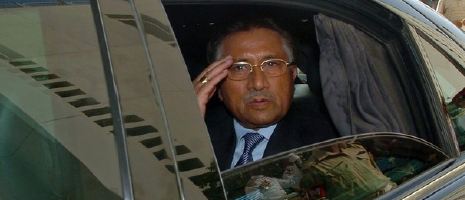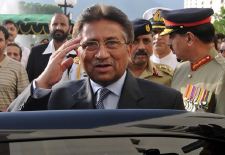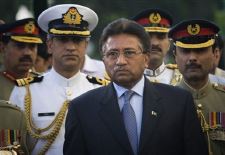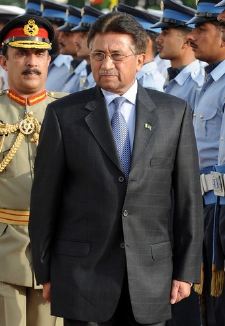Adil Najam
In a nationally televised speech, Gen. Pervez Musharraf, President of Pakistan, has just announced his resignation, pre-empting a move to impeach him by the parliament.
This post has been updated to add news photos from this momentous day in Pakistan’s political history. The pictures speak eloquently of the moods and thoughts of the day. (Scroll down to see the video of Gen. Musharraf’s resignation speech).
Participate in a poll on what might be Pakistan’s future post-Musharraf, here.
![]()
Here is a Pervez Musharraf time-line, published in The News:
August 1943: Born in Delhi, India
1964: Joins Pakistani army.
1998: Becomes army chief of staff.
October 1999: Seizes power in a bloodless military coup, overthrowing the prime minister, Nawaz Sharif. In response, the Commonwealth suspends Pakistan’s membership.
June 20 2001: Makes himself president, replacing Rafiq Tarar, while remaining head of the army. Tarar is forced out of office when the parliament that elected him is dissolved.
July 2001: Holds first meeting with the Indian prime minister, Atal Bihari Vajpayee, at Agra in India. No progress is made because of differences over the disputed territory of Kashmir.
September 2001: George Bush courts Musharraf, asking him to join him in his “war on terror” and help defeat the Taliban in neighbouring Afghanistan. The US president promises Pakistan $1bn in aid.
April 2002: Wins a referendum giving him another five years in office. Observers criticise the referendum as blighted by irregularities.
May 2002: Pakistan test fires three medium-range surface-to-surface missiles capable of carrying nuclear warheads. Musharraf insists his country would not be the one to initiate war.
August 2002: Consolidates his power still further, giving himself the right to dismiss an elected parliament.
October 2002: Pakistan’s first general election since Musharraf seized power in 1999 results in a hung parliament.
November 2002: Mir Zafarullah Jamali becomes the first civilian prime minister since 1999. He is a member of a Musharraf-supporting party.
November 2003: Pakistan’s National Assembly meets for the first time since 1999.
December 2003: Musharraf promises to step down as head of the army by January 2005.
May 2004: Pakistan is readmitted to the Commonwealth.
December 2004: Musharraf announces he will stay on as head of the army.
August 2005: Pakistan tests its first nuclear-capable cruise missile.
March 2007: Musharraf suspends the chief justice, Iftakar Mohammed Chaudhry, triggering a wave of anger across the country and the first joint protests held by the parties of exiled former prime ministers Benazir Bhutto and Nawaz Sharif.
October 2007: Signs a corruption amnesty, opening the way for Bhutto’s return and a possible power-sharing agreement. Within hours of Bhutto’s arrival back in the country, bombers attack a Bhutto rally in Karachi, killing more than 100 people.
November 2007: Declares a state of emergency, rounding up opposition leaders at gunpoint. In the same month, Musharraf quits as head of the army, becoming a civilian president.
December 15 2007: Lifts state of emergency and announces plans to go ahead with parliamentary elections scheduled for January 8.
December 27 2007: Benazir Bhutto is assassinated at an election rally in Rawalpindi.
January 2008: Elections postponed until February 18.
February 2008: The two main opposition parties gain a clear majority in the elections.
August 2008: The two main parties strike a deal to impeach Musharraf if parliament backs the move.
August 18 2008: Musharraf announces his resignation



























































We should wait for dust to settle and then evaluate his years. I think that we will find that like all theothers he did some good things and some bad things. At the end he stayed on too long and should have left a year or two ago. That was his downfall really.
I actually think that Zardari has shown maturity by not forcing him through impeachment. We have to break this cycle of disgracing people by putting them in jail or hanging them or such things. Thsi is teh closest to a democratic transition of power we have ever come to.
I agree with people who are saying that things will get worse. But they would have been even worse had he stayed.
Those of us who believe in democracy have to brace ourselves for the tough times. The real test is whether in these tough times we will give up on democracy or stay with the principles of democracy.
I am ready for the tough times because things WILL have to become worse before they get better. That is why I voted for things getting much worse, because that is what is likely to happen.
People who are against Musharraf now, will repent later when they will see the “kartoots” of the new government. What Musharraf did was not easy, he proved that he is brave by not letting Pakistan fall into enemy’s hands. I don’t think he did anything wrong in the case of Lal Masjid. The mosque was built on illegal property and when the foundation is not legal how can everything else can be right. Didn’t they know that it’s also against Islamic teachings to do something illegally? and when they don’t know such a basic thing how can they preach Islam on such a large scale? Another thing is that Islam nowhere says that we should come into the streets carrying weapons to forcefully impose Islam. The students of Lal Masjid were extremists and they were being brain-washed there which was extremely dangerous for Pakistan and its people. They were being taught the wrong meaning of Jihad same like the suicide bombings and they were also being taught that their main aim should be to achieve the rank of a shaheed, it was like they didn’t want to live and just be a shaheed. You guys tell me does Islam anywhere says that its should be our main aim to be a shaheed or kill all the desires of living and just wait for our death and anyways there no such concept in Islam of doing jihad against Muslims themselves. The objective of the people of Lal Masjid was obviously good i.e to impose Shariah in country but there way of doing that was not right at all. Islam strictly discourages this act that one should be forced to follow Islam but the Lal Masjid people would beat any woman they saw walking on the streets barehead. Whats that?!! I mean helloo do you guys even know the meaning of Islam that you have taken up such a big responsibility. And this all grew up to be such a threat to the safety for the residents of Islamabad espacially that there was a need to take a severe step against them and by the way how could anyone just sit and do nothing seeing that people are preaching wrong Islam and that too in a madarsah whose foundation itself is illegal!!!
I would also like to discuss about talibaans, someone here said that Musharraf killed them and they achieved the rank of shaheed. Excuse me?!!! Again the same thing goes here that Talibaans are extremists. Don’t you know that they dont allow any women in Swat or the North-Western areas to come out of house barehead? That’s not done at all, it’s their choice and no one can force them to do anything and Islam says exactly the same. And who do you think is responsible for all those burnt girls’ schools in Swat? They don’t believe in equality and they don’t know Islam. Also Talibaans themselves accepted that they are responsible for the blast in a market in Islamabad and according to them it was the answer to the capturing of their men by the government. Do you think it’s fair? Is suicide bombing the only way to get revenge? What is the crime of the innocent people who were killed?
So, my main point was that all these people forced Musharraf to take such extreme steps otherwise he desperately tried to solve the matters through discussions and negotiations but obviously these people didnt want that so Musharraf had to do so.
Dear ATP, can you do a poll of who do people think will be the new President?